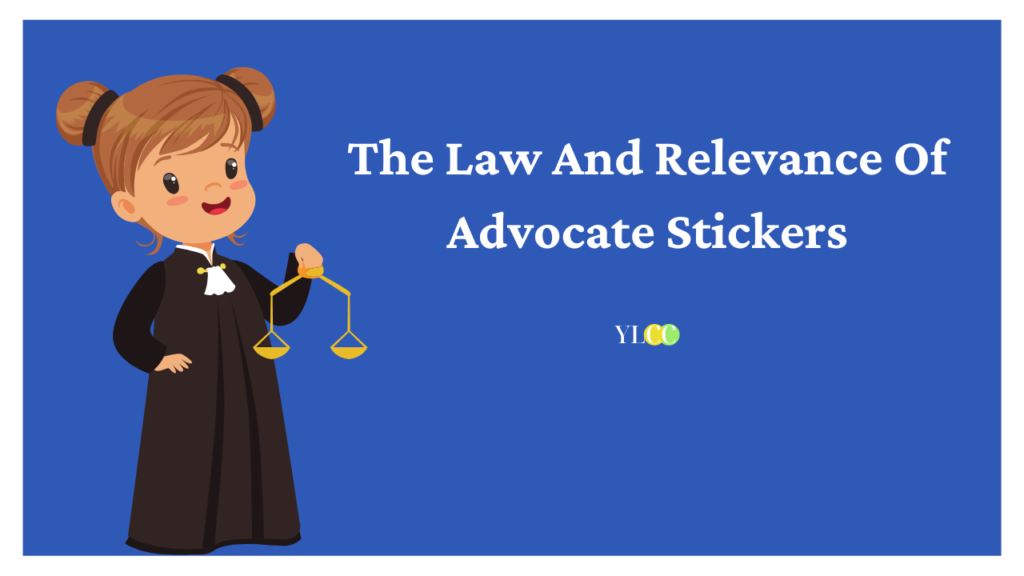
INTRODUCTION
An advocate sticker is a logo that represents the legal profession which is generally in the form of a sticker that is usually printed and pasted on the vehicle. Often, Police officers do not stop vehicles having Advocate stickers due to which people take due advantage of it and often misuse it. Only a few people, apart from lawyers and law students, are aware that the Bar Council of India issues stickers to advocates for some purpose. One of the major reasons is that parking places in courts are scarce, advocate stickers on the vehicles help the advocate or judge to get a permanent parking spot. It eases the work of authorities to identify an advocate or a judge as other vehicles are rarely allowed in courts. If someone does not possess the sticker on the vehicle then they have to show their permit/id card every time they enter and exit, which can at times be inconvenient.[1]
LAW ON USING STICKERS ON MOTOR VEHICLES
As per Section 177 of the Motor Vehicle Act, it is illegal to use stickers on vehicles. The stickers can be any type that is concerned with caste, religion, career, and politics. The reason for such prohibition is that it presents you as above the law, promoting casteism and communalism, as well as violating Article 14 of the Constitution as Article 14 talks about equality and such stickers incorrectly distinguish you from ordinary citizens.
Fines are imposed primarily as they divert the driver’s attention away from the road and can lead to road accidents. Such a sticker will as per law result in a fine of 100 rupees on the first offense and 300 rupees on consecutive offenses. It is pertinent to note that various state governments organize operations from time to time to punish offenders and issue challans.
MISUSE OF ADVOCATE STICKER
Vehicles with advocate stickers are frequently used to flout traffic laws as often nobody dares to intervene in legal matters or with legal professionals for fear of being sued and dragged to court. Stickers have suddenly become a tool for breaking legislation, which was not at all the purpose of issuance of these stickers. Often it is seen that advocate stickers are displayed on vehicles that do not belong to practicing advocates which implies that individuals from non-legal professions are also using these stickers in an unlawful manner. Law has long been seen as a noble profession and Advocates have preserved the dignity of this profession. However, the abuse of the Advocate sticker for undue benefits is now tarnishing its image. It is pertinent to note that it is illegal to use an Advocate sticker if you do not have a law degree or are not enrolled in any Bar Council.
At times a vehicle with an advocate sticker or a designated sticker is allowed to pass without security checks before entering any government building, such as the Secretariat, the Supreme Court, or the High Courts whereas a normal vehicle passes through a series of security inspections. Therefore, to reduce the misuse of stickers, their validity must be thoroughly confirmed, and the vehicle must be thoroughly examined at security checkpoints, before they are allowed entry on any premises.
In a case before the Madras High Court, the circumstances were that the car had an advocate sticker on it, and when the police officers stopped it, they discovered a high amount of ganja inside, as well as one of the revenue officials was also found in it. The court said that putting flags and designation boards on the car is a direct step to impede police officers from inspecting the vehicle and from carrying out their tasks.[2]
The Madras High Court Bench while hearing a PIL stated that “No one has the authority to disobey the law or engage in illegal behavior. Flags, designation boards, photos of party/communal leaders, and advocate/press stickers are all used to demonstrate that they are members of a privileged group and to break the law. The use of stickers of any type on any component of the vehicle is prohibited per Section 177 of the Motor Vehicle Act of 1988. Every car owner/driver has a responsibility to respect traffic rules, and no one has the right to break traffic rules based on their political or social status.”[3]
On the issue of misuse of Advocate stickers, the Madras High Court said – “Advocates are officers of the court and the primary purpose of the stickers is for access of vehicle to the designated parking lot. The sticker can hardly be a license to break the law, including traffic rules or not wearing helmets, or, for that matter, breach of any other law. All are equal before the law and so police are entitled to proceed in accordance with the law,”[4]
CONCLUSION
There is a need for administrative scrutiny and rigorous approach with respect to the use of advocate stickers. Amendments with respect to the punishment and fine can be more strict as the fine which is currently penalized is very less as compared to the illegal use of sticker offense. It is clear from the above-mentioned case laws that sticker use is justified but its misuse cannot be ignored. The police officials need to be strict while conducting their duties, if any law is broken then the police should take actions similar to that which is taken by a normal citizen. The use of technological advancement can be taken to test the authenticity of the advocate sticker so that there are fewer chances of illegal use.
[1]LEGAL BITES, https://www.legalbites.in/is-it-legal-to-put-stickers-on-cars-in-india/ (last visited June 15, 2022).
[2]LEGAL BITES, https://www.legalbites.in/is-it-legal-to-put-stickers-on-cars-in-india/#_ftnref4, (last visited June 16, 2022).
[3]LATEST LAWS https://www.latestlaws.com/latest-news/hc-we-deprecate-advocate-and-press-stickers-usage-on-vehicles-aimed-to-intimidate-police-orders-removal-read-judgment-176379#:~:text=The%20act%20of%20having%20flags,any%20part%20of%20the%20vehicle, (last visited June 16, 2022).
[4]TIMES OF INDIA, http://timesofindia.indiatimes.com/india/Advocate-sticker-on-vehicle-not-a-licence-to-break-road-rules-Madras-HC-says/articleshow/47970671.cms, (last visited June 16, 2022).
YLCC would like to thank Anam Khan for her valuable insights in this article.






